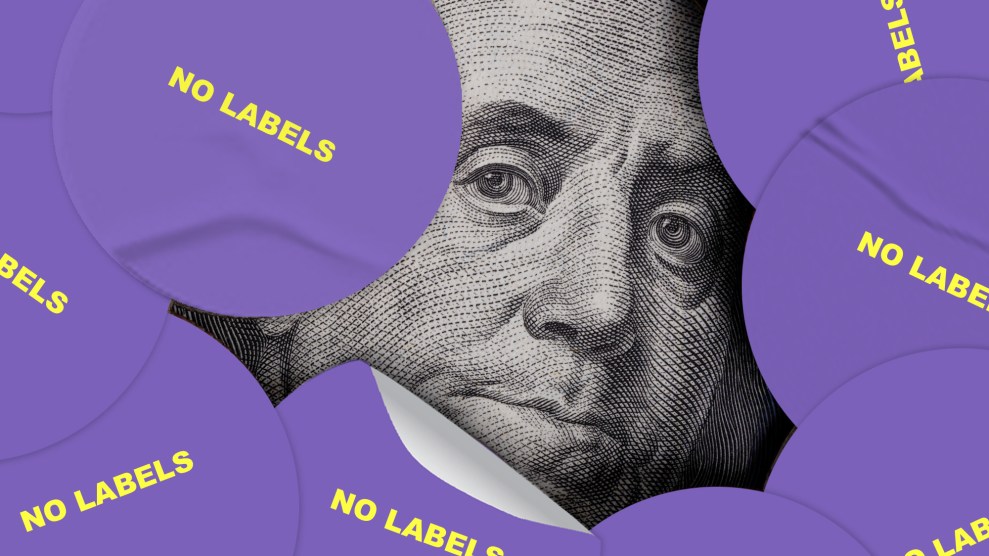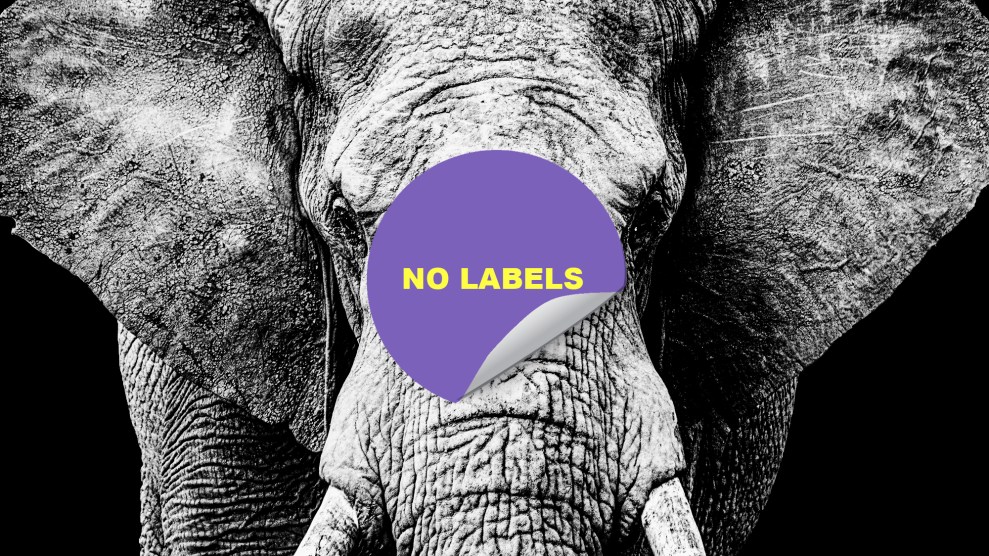
Mother Jones; Getty
No Labels, the political outfit preparing to run a “unity” ticket in 2024 that Democratic strategists and Never-Trump Republican operatives fear will siphon votes from President Joe Biden, is what’s known as a dark-money group. Unlike political parties, political action committees, and House, Senate, and presidential candidates, it is not required to reveal who is funding it. And No Labels, which says it intends to raise $70 million to possibly place a third-party candidate on the presidential ballot next year, refuses to disclose who is financing this project. But Mother Jones has obtained a list of 36 wealthy contributors and corporate high-rollers who last year wrote big checks to support No Labels’ effort to win 2024 ballot lines in states across the nation. This roster includes past and present chief executives of major companies, including Loews Corporation (a vast conglomerate), Fluor (an engineering and construction giant), Abry Partners (a private equity firm), SailPoint (a tech firm), and Fortress Investment Group.
Among the No Labels backers are donors who contributed millions of dollars to Republican causes, such as past GOP presidential candidates and super-PACS connected to Republican congressional leadership, and several who have poured money into the Democratic presidential campaigns of Barack Obama, Hillary Clinton, and Joe Biden. One donor provided a big chunk of political cash to Donald Trump. Generally, these No Labels supporters, who mostly made contributions of $5,600 to its 2024 project, appear to favor conservative candidates, though many have played both sides of the aisle, financing Republican and Democratic politicians.
Notable within this group is Michael Smith, the billionaire founder of natural gas behemoth Freeport LNG. He has donated more than $5.5 million to the Senate Leadership Fund, a super-PAC tied to Senate minority leader Mitch McConnell. Smith also backed Virginia GOP governor Glenn Youngkin and a slew of Republican senators. He has donated—albeit smaller amounts—to several moderate Democrats, such as Montana’s Jon Tester and West Virginia’s Joe Manchin. Meanwhile, Smith’s wife, Iris Smith, another contributor to this No Labels project, has been a major donor to Democratic causes. In 2020, she gave more than $500,000 to Biden’s presidential victory fund—a joint fundraising committee that split the money between Biden’s campaign and other Democratic party groups. In the weeks before she made this donation, she wrote checks to the reelection campaigns for GOP Sens. David Perdue and Thom Tillis. She has also contributed to McConnell and Republican Sen. Tom Cotton.
The Smiths did not respond to a request for comment.
A stalwart Republican donor on the list is Tom McInerney, a private-equity investor, who has regularly donated to the Republican National Committee and GOP-linked super-PACs. This year, he has contributed nearly $100,000 to the RNC and over $200,000 to the National Republican Congressional Committee. He has sent six-figure contributions to fundraising committees organized by House Speaker Kevin McCarthy ($250,000 in 2021) and by former speaker Paul Ryan ($244,000 in 2017). He has been a financial backer of McCain, Mitt Romney, and Jeb Bush. He recently donated to Sen. Tim Scott (R-S.C.), who is running for the GOP presidential nomination.
McInerney did not reply to a request for comment.
Three donors on the list contributed to Trump, but only one, Allan Keen, a successful Florida real estate developer, gave a hefty amount. In the run-up to the 2020 election, Keen donated $135,000 to Trump Victory, a joint-fundraising committee that supported Trump’s reelection. Previously, Keen financially backed the presidential campaigns of George H.W. Bush, George W. Bush, Jeb Bush, McCain, and Romney. More recently, he has donated to Manchin and Arizona Sen. Kyrsten Sinema, who left the Democratic Party in December and became an independent.
At least 16 of the these 36 donors have graced Sinema with money.
Keen could not be reached for comment.
Some of these donors have supported No Labels in the past. Peter Resnick, an investor from Connecticut, gave No Labels Action, a super-PAC, $93,000 in 2018. That year, the No Labels super-PAC supported a bipartisan slate of Democratic and Republican congressional candidates. Resnick has also backed the presidential campaigns of Obama and Biden. Last fall, he made large donations to the Democratic Congressional Campaign Committee.
Resnick did not respond to a request for comment.
Thomas “Mack” McLarty III, who was President Bill Clinton’s first White House chief of staff, donated $1,000 to the No Labels 2024 initiative. Alfred Spector, a noted computer scientist who was once vice president of research at Google and then a top executive at Two Sigma Investments, a tech-oriented hedge fund, contributed $2,000. Martha Ehmann Conte, a San Francisco-based investor and philanthropist who co-founded WomenRun, which identifies and supports “center-right Republican women to run for federal elected office,” gave $5,600. Dennis Blair, a former US director of national intelligence and a No Labels board member, kicked in $5,600.
The path to locating the federal filing that included this list of donors is convoluted, but it illustrates how dark-money groups operate.
As a nonprofit, No Labels must file tax returns that are public. The most recent return publicly available covers 2021. That year, No Labels raked in $11.3 million from unidentified patrons. The document reports that $2.4 million—a whopping 21 percent of all the money that came in—was given as a grant to a group called Insurance Policy for America, Inc., which was incorporated in Delaware on December 20, 2021 and located at the same Washington, DC, address as No Labels.
In a filing submitted to the IRS, IPFA noted that its president, treasurer, and secretary was Jerald Howe Jr., a top executive at Leidos, a defense, aviation, information technology, and biomedical firm (formerly known as Science Applications International Corporation). Howe is a co-founder and treasurer of No Labels.
No Labels sent IPFA the $2.4 million three days after IPFA was set up.
IPFA, according to reports it filed with the IRS, did not raise or spend any money for the first seven months of 2022. Then it became active. In August, it raised nearly $200,000 from these three dozen supporters, and it spent $173,000 in August and September. A report it submitted last month to the IRS detailed the donations and the expenditures.
Nearly all of the money spent by IPFA went to Capitol Advisors, an Alexandria, Virginia-based consulting firm run by Michael Arno, a veteran consultant with expertise in ballot initiatives and state petition drives. He tells Mother Jones his main task was “to get No Labels ballot access” in states across the nation. The money paid to Capitol Advisors, according to Arno, included covering the costs of the petition work done in various states. In the last three months of 2022, Insurance Policy for America paid Capitol Advisors $1.1 million. It also paid Blitz Canvassing, a Colorado-based firm, $107,000 to help it obtain a No Labels line on the ballot in the Rocky Mountain state.
Arno notes that he stopped working for No Labels in April and signed a nondisclosure agreement with the group. “It was a lot of work. I’m getting older, and it was time to pass the torch,” the 67-year-old Arno explains. He says he helped No Labels seek ballot lines in about 10 states. So far, No Labels has gotten onto the ballot in four states: Alaska, Arizona, Colorado, and Oregon.
A strategist familiar with No Labels’ operations says they do not know why No Labels spun off IPFA to collect these donations and spend money on its ballot-access operation. According to Delaware corporate records, IPFA changed its name to No Labels Ballot Access on July 19, 2022, but it continued to file reports to the IRS under the name Insurance Policy for America.
On Tuesday, a Mother Jones reporter contacted Ryan Clancy, the lead strategist for No Labels, and left him a voicemail message requesting to speak to him about the group’s tax return. Clancy replied by email requesting a query be sent to him via an email and noted, “I will look into [it].” The reporter followed up with emails listing questions about the creation of Insurance Policy for America, the transfer of $2.4 million to IPFA, the use of IPFA for No Labels’ 2024 project, and the donations to IPFA. Clancy did not respond.
Maryanne Martini, communications deputy for No Labels, and Nancy Jacobson, the president and CEO of No Labels, did not respond to requests for comment. Neither did Howe.
No Labels is continuing to organize petition drives to win lines on the 2024 state ballots. “We’re going for as many states as we can across the country,” Clancy recently told NPR. The group says its aim is to run a ticket comprised of a Democrat and a Republican, if the public sours on the available choices (such as Biden and Trump). Its top officials have issued conflicting statements about what would trigger the organization to proceed with its own nominee.
The most discussed potential candidate for No Labels has been Manchin, who has declined to say whether he would participate in this effort. Poll data suggesting a No Labels campaign would hurt Biden more than Trump—as well as the conservative bent of the few previously known funders of the group, such as billionaire Harlan Crow, the billionaire benefactor of Supreme Court Justice Clarence Thomas and a collector of Nazi memorabilia—has prompted Democratic strategists to speculate that this endeavor is a not-too-secret project to elect Trump or another Republican. Prominent Democratic operatives and Never-Trump Republicans recently met privately in Washington, DC, to discuss how best to counter a No Labels presidential campaign.
No Labels insists its work addresses the concerns of voters who have become disillusioned with modern American politics and the partisanship of each side. Yet it sticks with the cynical and common tricks of the trade and eschews transparency and accountability, cloaking the moneybags who underwrite its operation. The list of donors found in the IPFA filing covers only a modest fraction of the money that has so far flowed into this No Labels venture; it is a small slice of the $70 million the group is aiming to collect for its 2024 plan.
The lion’s share of the money that has moved in and out of IPFA has not been disclosed in its filings with the IRS, and there is no telling whether the listed donors are representative of the organization’s overall sources of financing. Most of the funding for No Labels’ 2024 project remains secret, as this group that claims to be addressing popular disenchantment continues to use the same-old tactics of big-money politics and keeps the voters in the dark.









